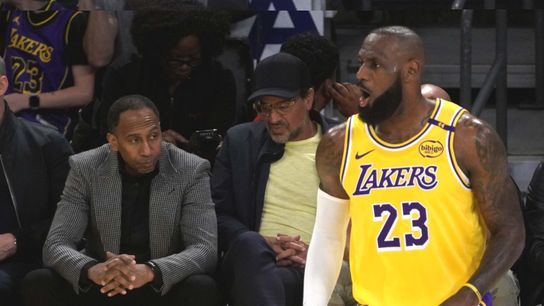LOS ANGELES –– This is not a feud. This is a farce—a shoddy spectacle starring two men who breathe the same rarefied air, crave the same blinding spotlight, and wield power like cudgels in a world where relevance is religion.
LeBron James, the king without a crown he refuses to relinquish.
Stephen A. Smith, the court jester who became a kingmaker.
Their clash? Inevitable. Their conflict? A mirror held up to the madness of modern sports media—a carnival of clicks, hot takes, and manufactured outrage where truth is trampled, and empathy evaporates.
LeBron, the anointed one, the all-time leading scorer, the corporate colossus. Stephen A., the voice that shakes studios, the provocateur who turns whispers into wildfires. Both built empires on attention. Both now risk burning them down for the same.
The spark? Bronny James. A son, a prospect, a pawn. When Smith dared to say the quiet part loud—that Bronny, recovering from cardiac arrest, raw and unready, didn't belong in the NBA—LeBron pounced, not as a player or a mogul, but as a father. Courtside at crypto.com Arena, he became fury personified, storming toward Smith like a thunderclap.
"Keep my son out of this s—t," James seethed.
A demand. A warning. A performance.
But let's be clear: This was never just about Bronny. This is about legacy. Leverage. The unquenchable thirst to control the narrative.
LeBron, who's spent two decades sculpting his mythos, knows the media's blade cuts both ways.
He was deemed "The Chosen One" at 17, a messiah in Nikes, shouldering expectations that would crush continents. Now, at 40, he's the patriarch, the protector, the puppeteer pulling strings to plant his son beside him in purple and gold.
Klutch Sports' fingerprints are everywhere—draft machinations, media whispers, the whole sordid symphony.
And Smith? The self-proclaimed "Most Visible Man in Sports Media" couldn't resist the bait.
With Bronny, he didn't castigate; he critiqued. He didn't attack; he analyzed. But in the arena of hot takes, nuance is noise. So he sharpened his tongue, leaned into the lens, and played his role—the gadfly, the instigator, the man who made Kwame Brown cry and Smush Parker vanish.
Power vs. power. Ego vs. ego. A duel where both men win by losing because the spotlight never dims.
But what of Bronny? The boy-turned-prospect, the son paving his own path towards NBA relevance in his father's elephantine shadow? His two-point cameos are dissected like Oscar speeches. His three-minute garbage-time strolls are framed as epics.
We've turned his dream into discourse, his journey into junk food for the content machine.
Is it fair? Is it foul? Does it matter?
In this circus, the show must go on.
Think of the precedent. The Malice at the Palace—players invading stands, fists flying, reputations shattered. Imagine if LeBron had swung. Imagine if Smith had snapped. Would the NBA fine the king? Would ESPN fire its loudest cannon? Or would we simply mint new hashtags, churn new takes, and cash the checks?
This isn't sports. This is soap opera.
A tragedy in three acts: The Hero, The Critic, The Son.
We are the audience, complicit and ravenous, demanding encore after encore.
But here's the rub: LeBron isn't wrong to defend his child, and Smith isn't wrong to question a nepotism pick. The sin isn't in their actions—it's in our appetite for drama. We build icons to bash them. We preach empathy while peddling venom. We demand greatness, then dissect it with dull knives.
So where does it end? When the clicks clam up? When the sponsors flee? Or when someone—father, critic, son—finally breaks?
The curtain falls. The crowd roars. The cycle spins anew.
And somewhere in Los Angeles, a young man just wants to hoop.

